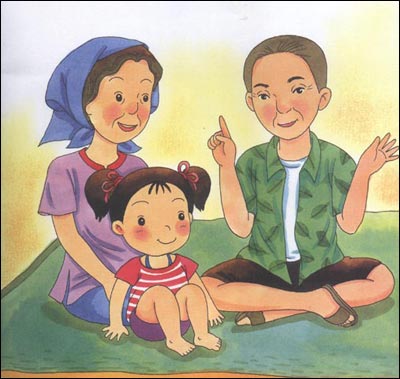Openness to Criticism # 1
The person with openness to criticism refers to someone
who learns easily and is gentle in response to teaching.
A person who has been paralyzed, even though surrounded by many useful things, but they are all useless to that person because the paralyzed person cannot pick up to make use of the benefits.
In the same way, if a person is stubborn, even though they might have an Arahant as a teacher, are unable to absorb any of the knowledge and goodness for themselves.
Definition of Openness to criticism
The person with openness to criticism refers to someone who learns easily and is gentle in response to teaching. When a person of knowledge teaches them something useful out of compassion, they will follow the advice given with respect and humility, they will do what they have been advice without showing reluctance, without retaliate and no excuse of any kind.
Some people can tolerate on all forms of physical hardship, physical suffering, physical suffering, mental suffering, mental anguish and temptation, but they cannot tolerate when anyone gives them an advice. They will impatiently turn their back on the person and refuse the advice offered, because they have the seeds of stubbornness in them.
If that person has no intelligence, he will be so stubborn.
If the person has some intelligence, he will be so stubborn.
Therefore we should be a person with openness to criticism who learns easily and gently in response to teaching.
Characteristics of those open to criticism
The person who is open to criticism will have the following 11 characteristics.
1. Doesn’t answer back when warned or given advice:
They will not criticism someone back, not protest in return or make excuse when they are given advice, but accept that advice with humility.
2. Will not turn deaf ear when given advice:
They will make improvement and follow through the advice received.
3. Has no intention to find the negative motives of the person who has given them the advice:
They will not trying to find faults, but accept the advice from the person who has given them the advice.
Therefore we should be a person with openness to criticism
who learns easily and gently in response to teaching.
4. Facilitates further teaching:
They will follow the advice, acting on what they have been told in a way that will give the advisor the encouragement and compassion to pass on further advice to them.
5. Has the highest respect for what they have been taught and for the person who has given the advices:
They realize that anyone who comes up to give them advice is taking a great risk of unfavorable response from them. They accept that the advisor must really have compassion and great intention to them, so they value the advice of the adviser and respect the adviser.
6. Will show the greatest humility:
They will response to the criticism without expressing stubbornness and without being conceited, pretending as if they already knew better.
7. Will express their happiness and gratitude at having received advice:
They would express appreciation. They feel really thankful to the critic that help identify their weakness so they can make proper improvement, it is as if they had found a hidden treasure, so they never stop expressing their appreciation toward the adviser.
8. Not being stubborn to follow the advice to an appropriate extent.
Not being obstinate or self-assertive to continue to err even thought they know it is wrong. Once they accept that they are wrong, they will correct and follow the advice to an appropriate extent according to the Dhamma teaching.
9. Has acceptable and polite behaviour:
They will be open to criticism and able to resist any temptation to burst into a tantrum or be unpleasant to the person given the advice.
10. Invite the advice or criticism from others:
They listen with intention to all sides of advice given without answering back and also invite the person to speak up again if they ever notice anything else in their behaviour which needs improvement.
11. Are tolerant even to advice that comes in the form of unpleasant speech:
They always show tolerant to the adviser, because they appreciate the passion and intention the advisor having toward them.
They have the Dhamma as their principle of life.
These eleven characteristics can be summarized down to three main characteristics of those open to criticismbeing able to:
1. Hear out the advice: They will not criticism someone back, not protest in return or make excuse when they are given advice and not trying to find fault of the person who give them the advice.
2. Follow the advice: They will not express any resistance. They will not hesitate or postpone making an improvement and will follow through the advice received.
3. Appreciate the goodwill of the person who has given the advice:
They will not be unpleasant or being conceited to the person given the advice. They are able to tolerate to advice that comes in the form of unpleasant speech even though the advisor is
- More superior: which could make it easy for them to accept the advice received.
- In equal level: which could make it difficult for them to accept the advice received.
- More inferior: which could make the most difficult for them to accept the advice received.
Three categories of those open to criticism
In general we usually think that one who listen to others without resistance and follow the advice is a person who is open to criticism. But this is not quite correct, because they can be differentiated into three different categories according to their ulterior motives for being open to criticism
1. Materiality-motivated:
Some people make themselves very obsequious because they seek for some material reward in return. For example, the children are so obedient to the parents because they want to receive the legacy from their parent, the subordinate obedient to the boss for the chance of being promoted. They are not really a person with openness to criticism, but they are only trying to compliant and are obsequious.
2. The gullible:
They are obedient because they lack of self confidence, they lack of any intelligence to think for themselves. They lack any initiative of their own. If you tell them to go to school, they will go, or you can either tell them to skip school, to go drinking, to go gambling, or to go to the temple, they will do anything they are told. They are not really persons with openness to criticism, but they are the gullible one.
3. Spiritually motivated:
They have the Dhamma as their principle of life. They will accept the criticism as treasure that helps them make improvement towards the goal of perfection. Only this last category of people is really open to criticism.
Meditation - Related Articles
" />
" />
" />
" />
" />
" />
" />
" />
" />
" />
" />
" />








